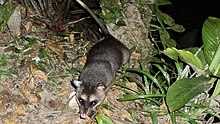Gray and black four-eyed opossum
| Gray and black four-eyed opossums[1][2][3] | |
|---|---|

| |
| Philander opossum | |
| Scientific classification | |
| Domain: | Eukaryota |
| Kingdom: | Animalia |
| Phylum: | Chordata |
| Class: | Mammalia |
| Infraclass: | Marsupialia |
| Order: | Didelphimorphia |
| Family: | Didelphidae |
| Subfamily: | Didelphinae |
| Tribe: | Didelphini |
| Genus: | Philander Brisson, 1762 |
| Type species | |
| Didelphis opossum Linnaeus, 1758
| |
| Species | |
The seven species in the genus Philander, commonly known as gray and black four-eyed opossums, are members of the order Didelphimorphia. Mature females have a well-developed marsupium. The tail appears to be hairless except for the proximal (closest to the body) 5 or 6 cm, which has a few long hairs. The tail is slightly longer than the head-and-body length, and it is black for the proximal one half to two thirds of its length. The genus is closely related to Didelphis but the species of Philander are smaller than those of Didelphis. The genus formerly included Metachirus nudicaudatus, but this species lacks a pouch and so is now considered a separate genus.[4] The common name comes from the white spots above the eyes, which can appear from a distance to be another set of eyes.
References
- ^ Gardner, A. (2005). Wilson, D.E.; Reeder, D.M. (eds.). Mammal Species of the World: A Taxonomic and Geographic Reference (3rd ed.). Johns Hopkins University Press. pp. 16–17. ISBN 978-0-8018-8221-0. OCLC 62265494.
- ^ Lew, Daniel; Roger Pérez-Hernández; Jacint Ventura (2006). "Two new species of Philander (Didelphimorphia, Didelphidae) from northern South America". Journal of Mammalogy. 87 (2): 224–237. doi:10.1644/05-MAMM-A-065R2.1.
- ^ David A. Flores; Barqueza, RM; Díaza, MM. (2008). "A new species of Philander Brisson, 1762 (Didelphimorphia, Didelphidae)". Mammalian Biology. 73 (1): 14–24. doi:10.1016/j.mambio.2007.04.002.
{{cite journal}}: Unknown parameter|last-author-amp=ignored (|name-list-style=suggested) (help) - ^ Gardner, Alfred L. (2008). Mammals of South America: Marsupials, xenarthrans, shrews, and bats. University of Chicago Press. p. 669. ISBN 0-226-28240-6.
